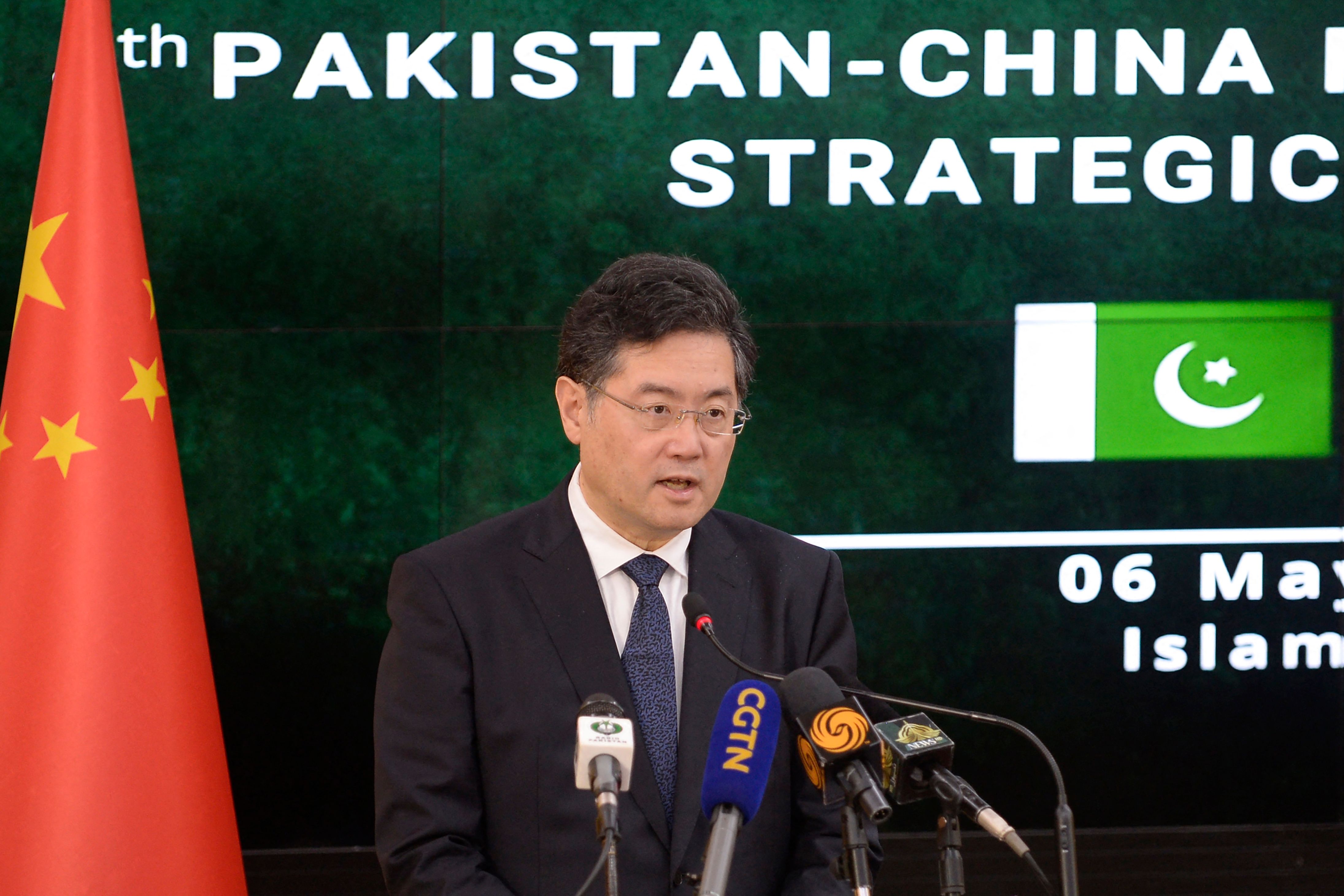Chinese investments, trade relations, diplomatic overtures, and geopolitical penetration of the Gulf and South Asia are broadly altering the economic and political landscapes of local countries. Notable developments like the Chinese-brokered Saudi Arabia-Iran agreement signed in March 2023, the roughly $300 billion economic and security pact China reached with Iran in 2021, and ongoing work on the $65 billion China-Pakistan Economic Corridor (CPEC) have all reshaped strategic thinking across the region.
MEI cordially invites you to an expert panel that will examine the growing multifaceted impact of Beijing’s outreach to the wider Middle East — namely the countries of the Gulf and South Asia. In what ways did Pakistan’s close relations and economic dependency on China influence its reaction to the growing Chinese involvement with Saudi Arabia and Iran? What has a more regionally engaged China meant for Afghanistan’s Taliban government? And how has India, with its expanding economic links to Arab countries and Iran as well as long-running defense ties with Russia, reacted to increased Chinese involvement in all those key partners? Please join us as our assembled scholars discuss these questions, think through the possible consequences of China’s policies for the unfolding Great Power competition across the region, and consider whether and how the United States should reprioritize its global strategic and security interests in response.
Speakers
Yun Sun
Senior Fellow and Co-Director, China, East Asia, Stimson Center
Daniel Markey
Senior Advisor, South Asia Programs, USIP
Khaled Almaeena
Fmr. Editor-in-Chief, Arab News; Saudi Gazette
Syed Mohammad Ali
Non-Resident Scholar, Middle East Institute
Gerald M. Feierstein, moderator
Distinguished Senior Fellow on U.S. Diplomacy; Director, Arabian Peninsula Program, Middle East Institute
Detailed Speaker Biographies
Yun Sun
Yun Sun is a Senior Fellow and Co-Director of the East Asia Program and Director of the China Program at the Stimson Center. Her expertise is in Chinese foreign policy, U.S.-China relations and China’s relations with neighboring countries and authoritarian regimes. From 2011 to early 2014, she was a Visiting Fellow at the Brookings Institution, jointly appointed by the Foreign Policy Program and the Global Development Program, where she focused on Chinese national security decision-making processes and China-Africa relations. From 2008 to 2011, Yun was the China Analyst for the International Crisis Group based in Beijing, specializing on China’s foreign policy towards conflict countries and the developing world. Prior to ICG, she worked on U.S.-Asia relations in Washington, DC for five years. Yun earned her master’s degree in international policy and practice from George Washington University, as well as an MA in Asia Pacific studies and a BA in international relations from Foreign Affairs College in Beijing.
Daniel Markey
Dr. Daniel Markey is a senior advisor on South Asia at the United States Institute of Peace. He is also a senior fellow at the Johns Hopkins University’s School of Advanced International Studies (SAIS) Foreign Policy Institute. From 2015 to 2021, Dr. Markey was a senior research professor in international relations at SAIS. From 2007 to 2015, Dr. Markey was a senior fellow for India, Pakistan, and South Asia at the Council on Foreign Relations. From 2003 to 2007, Dr. Markey was a member of the U.S. State Department’s Policy Planning Staff. His work focused on U.S. strategy in South Asia, especially Pakistan and India. Prior to government service, he taught in the Department of Politics at Princeton University and served as executive director of Princeton’s Research Program in International Security. Earlier, he was a postdoctoral fellow at Harvard’s Olin Institute for Strategic Studies.
Khaled Almaeena
Khaled Al Maeena is a veteran Saudi journalist, commentator, businessman and the former editor-in-chief of Arab News and Saudi Gazette. Al Maeena began his career in 1972, joining the Saudi Arabian Airlines (Saudia) as an intern. He worked at several positions in the airline including as chief editor of Saudi World. In 1982, he became the editor-in-chief of Arab News. Al Maeena was one of four journalists to cover the resumption of diplomatic ties between Saudi Arabia and Russia in 1990. He left his post in 1993, becoming the CEO of the Saudi Public Relations Company SPRC , a position he held for five years. He returned to the top editors post at Arab News in 1998 and continued until October 2011. He was appointed editor-in-chief of Saudi Gazette on 2 April 2012. Almaeena occasionally contributes commentary columns for Gulf News, Al Eqtisadiah, Times of Oman, Asian Age, The China Post, Asharq Al-Awsat, Al Madina and Urdu News. He was also a Saudi television news anchor, talk show host, radio announcer and lecturer. Khaled Almaeena also serves as a Member of Advisory Board for Gulf at TAIB Bank.
Syed Mohammad Ali
Syed Mohammad Ali has extensive experience working with multilateral, bilateral, government, and non-government organizations on varied international development challenges. He is a ‘Country of Origin’ expert for South Asian (Bangladeshi, Pakistani and Indian) asylum seekers in the U.S. and the U.K. Dr. Ali is the author of several peer-reviewed articles and book chapters as well as the book Development, Poverty and Power in Pakistan: The Impact of State and Donor Interventions on Farmers (Routledge, 2015). His other recent publications include a policy paper on the bilateral U.S.-Pakistan relationship co-sponsored by the Middle East Institute and co-authored with Dr. Marvin Weinbaum, and a special report on the devolution of power in Pakistan for the United States Institute of Peace. Dr. Ali also writes a weekly op-ed in the Express Tribune, an affiliate of The New York Times in Pakistan. He has taught international affairs, international development, and anthropology courses in Australia, Pakistan, and the United States. Recently, Dr. Ali has been teaching at Georgetown, Johns Hopkins, and George Washington universities.
Gerald M. Feierstein
Amb. (ret.) Gerald Feierstein is a distinguished senior fellow on U.S. diplomacy at MEI, and director of its Arabian Peninsula Affairs program. He retired from the U.S. Foreign Service in May 2016 after a 41-year career with the personal rank of Career Minister. As a diplomat he served in nine overseas postings, including three tours of duty in Pakistan, as well as assignments in Saudi Arabia, Oman, Lebanon, Jerusalem, and Tunisia. In 2010, President Obama appointed Amb. Feierstein U.S. Ambassador to Yemen, where he served until 2013. From 2013 until his retirement, Amb. Feierstein was Principal Deputy Assistant Secretary of State for Near Eastern Affairs. In addition to his career-long focus on the Near East and South Asia, Amb. Feierstein also played a prominent role in developing and implementing State Department policies and programs to counter violent extremism. As Deputy Coordinator and Principal Deputy Coordinator in the State Department’s Counter-Terrorism bureau, Amb. Feierstein led the development of initiatives to build regional networks to confront extremist groups as well as to counter terrorist financing and promote counter-terrorism messaging. He continued to focus on defeating terrorist groups through his subsequent tours as Deputy Chief of Mission in Pakistan and as Ambassador to Yemen.
In partnership with

Photo by -STR/AFP via Getty Images












